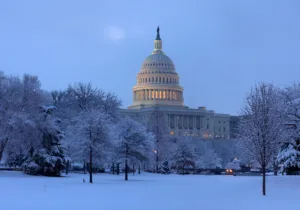You would have thought the president would have learned from Harry Reid’s blunder. But you would be wrong. Reid memorably—regretfully for Democrats—jettisoned the judicial filibuster in the confirmation of federal judges. Fast forward to the first two years of Trump’s presidency, and he’s already filled two Supreme Court vacancies that would have been stymied under the old rules. One would have thought Reid’s shortsighted gamble to back the DC Circuit Court would have taught Donald Trump a lesson.
President Trump signed the bill that appropriated money for increased border security, including money for a barrier, or wall if you like, on the southern border. It is not enough and does not go far enough at all to solve this issue once and for all. That is in part because we have a broken immigration system that needs reform across the border that addresses the issue of Deferred Action for Childhood Arrivals (DACA) and the millions of other illegal immigrants in our country. So the current bill is a band-aid, but at least Congress is doing something, which is better than the nothing they have been doing for a long time.
The president deserves some credit for applying this pressure, but instead of claiming a victory and seeking a comprehensive package in the future, Trump has declared a state of emergency and will use money from the Department of Defense budget to further fund his border wall. The legality of such a move seems highly dubious. The executive branch does not possess the power of appropriations; that belongs to Congress, and presidents cannot take money from various departments or agencies to enact their own preferred policies. But we’ll let the courts sort this out.
Leaving aside the constitutionality of Trump’s actions, there is a deeper moral question at stake that is not primarily a constitutional or political one. Philip Hamburger, a renowned legal scholar whose recent work has sought to take on the proclaimed legality of the administrative state, raises the question in his recent book on the subject.
Hamburger has made it his life’s crusade to take on the overweening power and the executive branch’s expansive claims to power. In Is the Administrative State Unlawful?, he addresses the legality of the current administrative bureaucracy in the executive branch. This may sound like a narrow and technical question, but he gets at the question by looking back at the pre-Constitution history behind what the framers and Anglo-American law were aiming to constrain through the use of constitutions—specifically, they were responding to extra-legal power English monarchs claimed and abused. The Constitution is the answer to the question of monarchic absolutism.
Royal prerogative claimed to have the force of law to legally bind subjects through its exercise. The American Revolution sought to address the abuses of King George III’s absolute power, and the Constitution stopped attempts for the executive to exercise unlawful power. Only the legislature or judiciary have the power to create legal obligations through the passage and interpretation of law. The executive branch has no lawmaking power because the abuses are too dangerous and tempting.
Yet here we find ourselves today, watching an American president claiming powers for himself to appropriate money for a project that Congress did not fund. American and British philosophers and politicians have long wrestled with this question of extra-judicial power, and the Founding Fathers believed they solved it in the seventeenth and eighteenth centuries. But they were wrong. It came back in the twentieth century and has been on display clearly in the last two presidents.
Just to be clear, this is not a Republican or Democratic issue. Both parties are guilty of using the executive branch to further their own agendas. The history of this abuse of executive power goes back at least to the early-twentieth century with progressives seeking a more efficient and technocratic form of government. Democrats cheered when President Barack Obama used executive orders and rulemaking within various agencies to advance their agenda. Likewise, many Republicans, the same ones who denounced Obama’s “imperial presidency,” cheer on President Trump’s recent actions.
The moral question at the heart of this centuries-long debate is whether we shall be ruled by law or by people—whether they be presidents, bureaucrats, or experts. If law rules us, then we must reassert the proper and limited role of the presidency and the executive branch within our constitutional system. This great achievement is in jeopardy when we grant the executive extra-legal powers. The deep foundations of the rule of law draw upon Christian and Jewish convictions about the way in which God rules through law and not through divinely sanctioned kings.
Americans fought a revolution over the exercise of absolute power. We should think long and hard about resurrecting absolutist tendencies in the modern presidency and how we can put the genie back in the bottle.
Daniel Strand, a Providence contributing editor, is a postdoctoral fellow in the Center for Political Thought and Leadership at Arizona State University. His scholarly interests are in the history of political thought, religion and politics, and the thought of St. Augustine of Hippo.
Photo Credit: King George III in Coronation Robes, by Allan Ramsay, circa 1765. Google Art Project, via Wikimedia Commons.







 Live in the DC area? Sign-up for Providence's in-person events list!
Live in the DC area? Sign-up for Providence's in-person events list!